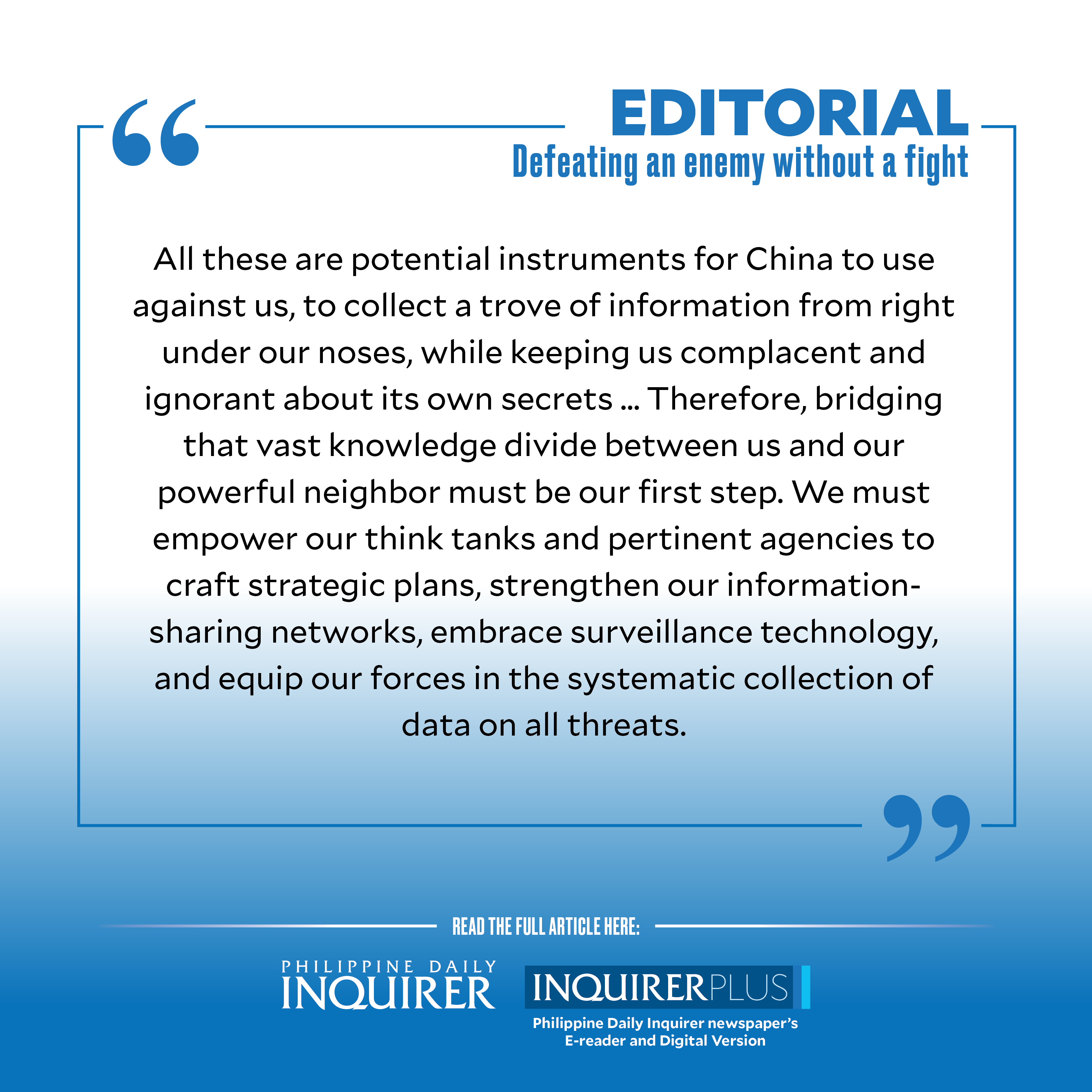
A quote often attributed to Napoleon Bonaparte goes: “Let China sleep, for when she wakes, she will shake the world.” Whether the French emperor did say that is a question for historians to argue about, but there is no arguing anymore against China’s ability to make nations tremble. All countries that share seas or borders with China, including the Philippines, are right to be wary as their neighbor flexes its military muscle in regions of dispute. While Beijing is not our enemy—yet—and claims to be our friend, the danger posed by this awakened dragon is as clear to us as the crystal waters of the West Philippine Sea.
That threat, as Defense Secretary Gilbert “Gibo” Teodoro Jr. has recognized, is not limited to China’s aggression toward our forces and fisherfolk in our maritime domains. It manifests in sinister ways within our own shores, in the unseen actions of Chinese nationals who could be living among us undetected as spies or sleeper agents, or of our own citizens, as traitors.
In August, Jonathan Malaya, assistant director general of the National Security Council, warned of China’s use of “political operators” engaged in “cognitive warfare” in the Philippines to sway public opinion.
The Inquirer reported, too, that some critics of China, like security expert Jay Batongbacal, retired Supreme Court Senior Associate Justice Antonio Carpio, and De La Salle University professor Renato De Castro, were approached in July by individuals who offered them money to write about Vietnam’s militarization in the South China Sea, purportedly to drive a wedge between Manila and Hanoi.
Our Ambassador to the United States Jose Manuel Romualdez spoke of how Filipino diplomats were on the receiving end of China’s “smear campaigns” to disrupt our ties with Washington, whose alliance with us is one of the few things keeping Beijing in check.
Such incidents mirror allegations against China in other parts of the world. In the United Kingdom, a parliament researcher has been accused of spying for China. In Canada, a public inquiry was launched to look into election meddling by China and Russia. In August, two US Navy sailors were arrested for leaking military secrets to the Chinese.
To be sure, all states are guilty of propaganda and espionage in one way or another, but the depth of Chinese interference in our affairs bears serious pondering.
On Wednesday, Teodoro suggested that Chinese workers in the Philippines were involved in “covert economic and information activities” to undermine Manila’s position.
“The best way how to weaken a country, rather than an overt warlike function or disruption of your facilities, is really to take control of [its] internal economy, internal processes, and the like,” Teodoro said. “It’s the activities that we cannot see … That’s what alarms us.”
The defense chief is justified in his concern, because soft tactics are indeed more treacherous than outward shows of power. As Sun Tzu wrote in “The Art of War”: “[The] best thing of all is to take the enemy’s country whole and intact … Hence to fight and conquer in all your battles is not supreme excellence; supreme excellence consists in breaking the enemy’s resistance without fighting.”
China may well be using this strategy against the Philippines. But how can we respond when even our critical installations appear to be within our opponent’s easy grasp?
The State Grid Corp. of China has a 40-percent stake in the National Grid Corp. of the Philippines, fueling persistent talk that Beijing has remote access to our national power transmission system.
Fears have also arisen about cell towers in our military camps built by a consortium that includes state-owned China telecom under a 2019 deal between the Armed Forces of the Philippines and the Mindanao Islamic Telephone Co. or Mislatel, now called Dito Telecommunity Corp. Despite a guarantee that no devices shall be used to telegraph classified information, Senate President Juan Miguel Zubiri has proposed toppling those structures as a precaution.
On top of that, the number of Chinese working in the Philippines has steadily risen, most of them in Philippine offshore gaming operators (Pogos) and in infrastructure works. But after the pandemic shuttered several Pogos, many are undocumented or overstaying.
All these are potential instruments for China to use against us, to collect a trove of information from right under our noses, while keeping us complacent and ignorant about its own secrets. As Sun Tzu warned: “If you know neither the enemy nor yourself, you will succumb in every battle.”
Therefore, bridging that vast knowledge divide between us and our powerful neighbor must be our first step. We must empower our think tanks and pertinent agencies to craft strategic plans, strengthen our information-sharing networks, embrace surveillance technology, and equip our forces in the systematic collection of data on all threats.
Ultimately, it is in these critical endeavors where our intelligence and confidential funds must go.

